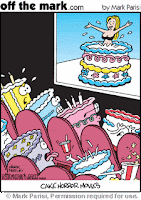Comparatives and superlatives
When we talk about two things, we can "compare" them. We can see if they are the same or different. Perhaps they are the same in some ways and different in other ways. We can use comparative adjectives to describe the differences.
FormOne syllable adjectives
Comparative: add er (cheaper)
Superlative: add est (the cheapest)
One syllable adjectives ending in 'e'
Comparative: add r (nicer)
Superlative: add st (the nicest)
One syllable adjectives ending in consonant - vowel - consonant
Comparative: add consonant + er (hotter)
Superlative: add consonant + est (the hottest)
Two syllable adjectives ending in 'y'
FormOne syllable adjectives
Comparative: add er (cheaper)
Superlative: add est (the cheapest)
One syllable adjectives ending in 'e'
Comparative: add r (nicer)
Superlative: add st (the nicest)
One syllable adjectives ending in consonant - vowel - consonant
Comparative: add consonant + er (hotter)
Superlative: add consonant + est (the hottest)
Two syllable adjectives ending in 'y'
Comparative: replace 'y' with ier (happier)
Superlative: replace 'y' with iest (the happiest)
Two or more syllable adjectives
Comparative: add more / less (more / less beautiful)
Superlative: add the most / the least (the most / least beautiful)
Irregular adjectives
good - better - the best
bad - worse - the worst
far - further - the furthest
Functions and examples
We use comparatives to compare two things.John is thinner than Bob.
It's more expensive to travel by train than by bus.
My house is smaller than my friend's house.
We use superlatives to compare one thing with the rest of the group it belongs to.
John is the tallest in the class.
He's the best football player in the team.
This is the most expensive hotel I've ever stayed in.
Important points
We do not use the with the superlative if there is a possessive.His strongest point is his ambition.
We use as + adjective + as to say that two things are equal in some way.
He's as tall as me.
Jim's car is as fast as mine.
We use not as to say that two things are not equal in some way.
He's not as tall as me.
Jim's car is not as fast as mine.
We can modify comparatives with much, a lot, far, a little, a bit, slightly.
Bob is much richer than I am.
My mother's hair is slightly longer than mine.
We can modify superlative with by far, easily and nearly.
Mario's is by far the best restaurant in town.
I'm nearly the oldest in the class.
If the second part of a comparative or superlative sentence is clear from what comes before or from the context, we can omit it.
Going by bus is very fast, but the train is more comfortable.
We can repeat comparatives to say that something is changing.
These exams are getting worse and worse every year.
She gets more and more beautiful every time I see her.
Formation of Comparative Adjectives
There are two ways to make or form a comparative adjective:- short adjectives: add "-er"
- long adjectives: use "more"
| Short adjectives | |
| old, fast |
| happy, easy |
| Normal rule: add "-er" | old → older |
| Variation: if the adjective ends in -e, just add -r | late → later |
| Variation: if the adjective ends in consonant, vowel, consonant, double the last consonant | big → bigger |
| Variation: if the adjective ends in -y, change the y to i | happy → happier |
| Long adjectives | |
| modern, pleasant |
| expensive, intellectual |
| Normal rule: use "more" | modern → more modern expensive → more expensive |
With some 2-syllable adjectives, we can use '-er' or 'more':
Exception- quiet → quieter/more quiet
- clever → cleverer/more clever
- narrow → narrower/more narrow
- simple → simpler/more simple
The following adjectives have irregular forms:
- good → better
- well (healthy) → better
- bad → worse
- far → farther/further
http://esl.about.com/cs/beginner/a/beg_compsup.htm
More Video
http://www.youtube.com/watch?v=mmnfche6lsU








